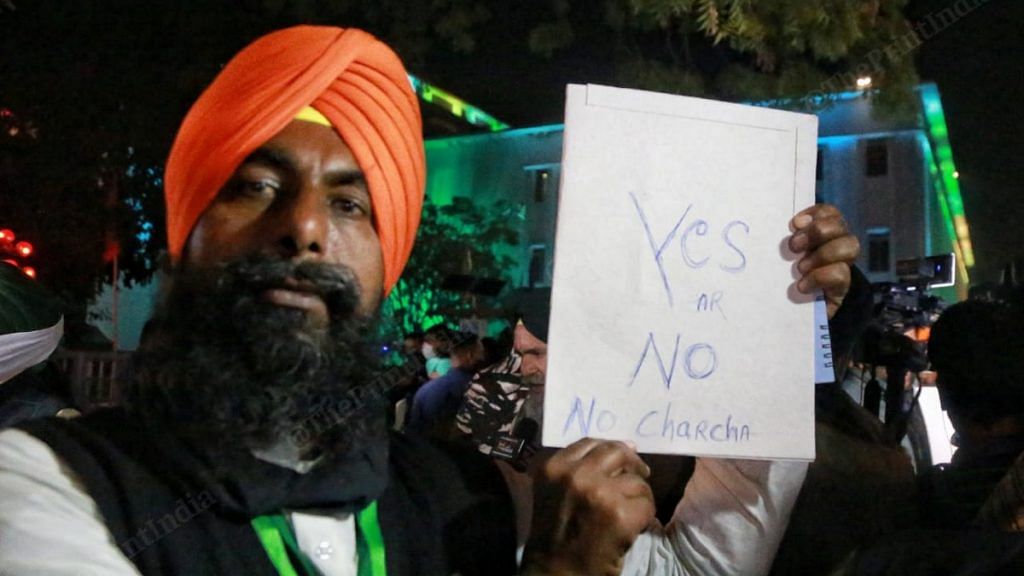Chandigarh: The farmers agitating at the borders of national capital Delhi are not just demanding a repeal of the three new farm laws enacted by the Narendra Modi government. They also want minimum support price (MSP) to be made their legal right. The farmers are asking the government to bring in a legislation that will make the purchase of crops below a “guaranteed remunerative MSP” (GRMSP) a cognisable, punishable offence.
GRMSP is the main demand in a proposed draft legislation that farmer leaders have handed over to the government in the course of their five rounds of talks.
The demand was also a part of the charter of nine demands that the All India Kisan Sangharsh Coordination Committee — an umbrella body of farmer unions that is spearheading the protests — had sent to Prime Minister Modi in July. The proposal has been accessed by ThePrint.
The draft proposal states that every farmer throughout India will be entitled to a GRMSP as a right, against the sale of any agricultural commodity. The farmers want that in all agricultural markets in India, including APMCs, the auction or offer price for every agricultural commodity will begin at the GRMSP as the floor price, that is, auction will not be allowed below that price.
According to the draft proposal, any trader, including a trader who enters into a contract farming agreement, will not purchase any commodity below the GRMSP. A trader who does so will be considered to have committed a cognisable offence.
For a first-time offender, a penalty twice the total deficit suffered by the farmers will have to be paid, along with three months of imprisonment. For a second-time offender, the imprisonment will be six months long, while for a third-time offender, the penalty will be three times the total deficit suffered by the farmer and 12 months of imprisonment, as well as a bar on future trading.
Also read: 5 reasons why Modi govt is finding it difficult to tackle protesting farmers
New central and state price guarantee commissions
The draft legislation also proposes that the GRMSP on all agricultural commodities will be fixed by a new Central Farmers Agricultural Costs and Remunerative Price Guarantee Commission. The prices will be fixed on the basis of a comprehensive estimation of cost of production.
The proposal states that the costs will include all paid out costs; imputed cost, including family labour at skilled wages; rates rental value of land; interest on assets and operations calculated for managerial functions performed by the farm household, in addition to the depreciation of assets and other components.
The proposed new commission is then expected to recommend these prices to the government while ensuring a profit margin of at least 50 per cent over the comprehensive cost of production it estimates for the agricultural commodity.
Within a month of receiving these recommendations, the government will notify the GRMSP of the commodity. Apart from notifying a GRMSP, the government can also notify an additional bonus on it.
Other than a central commission, each state will also constitute a price guarantee commission. A state commission will make recommendations on prices to the central commission every year, and could also recommend to state governments to give prices higher than those fixed by the central commission. These would be applicable only within that state.
The purpose of the state commissions is to include even those agricultural commodities which might have been left out by the central commission. State commissions can also recommend regulations to the state government, with regard to cost of agricultural inputs like seeds, fertilisers, pesticides, electricity, diesel, farm equipment etc.
The state commissions will also have powers, under the proposal, to inquire into cases of non-payment or delayed payment of GRMSP, and announce compensation to the farmers. The commission will also hear appeals and applications from traders in case they incur any losses.
Other measures
The proposal further states that the government will open an adequate number of procurement centres for all commodities — either directly, or through designated procurement agencies, or even through trader bodies, self-help groups or farmer producer organisations — in a localised manner to procure sufficient quantities for food schemes.
It adds that the central government will put into place measures to prevent import of subsidised agricultural commodities from elsewhere by enhancing import duties to ensure that the landing price of agricultural commodities from other countries is at least equal to the GRMSP.
Also read: Allies step up pressure on BJP to end deadlock with farmers, party says ‘treading cautiously’
